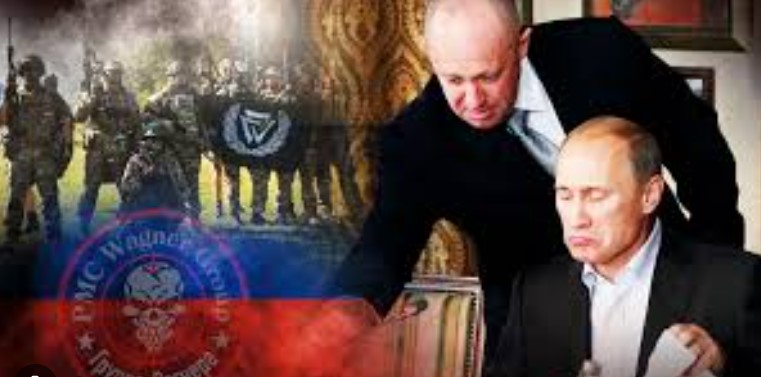Virendra Pandit
New Delhi: It was waiting to happen in Russia also which did not pay heed to what she said 12 years ago. As the then US Secretary of State Hillary Clinton warned Pakistan in 2011: “If you have snakes in your backyard, they won’t bite only neighbors.”
President Vladimir Putin, who reportedly freed criminals and got them organized into an unofficial ‘private army’, the Wagner Group, is now ruing his decision to push it into the ongoing Ukraine war. His former chef and henchman, Yevgeny Prigozhin, the mercenary army owner, has rebelled.
In a televised emergency address to the nation on Saturday, President Putin called it a “betrayal” and a “stab in the back.” He vowed to defend the country and crush the rebels.
“All those who prepared the rebellion will suffer inevitable punishment. The armed forces and other government agencies have received the necessary orders,” Putin said, as he condemned the rebellion at a time when Russia was “fighting the toughest battle for its future” with its war in Ukraine. “The entire military, economic, and information machine of the West is waged against us.”
Prigozhin, who owns and heads the Wagner group as a private military contractor, confirmed on Saturday morning that he and his troops reached a key Russian city after crossing the border from Ukraine, the media reported.
The militia chief posted a video of himself in Rostov-on-Don at the Russian military headquarters that oversees the fighting in Ukraine. He claimed that his forces had military facilities in the city under their control, including the airfield. Other videos posted on social media showed military vehicles, including tanks, on the streets outside.
Prigozhin said his forces faced no resistance from young Russian conscripts at checkpoints as they crossed into Russia from Ukraine, saying his troops “aren’t fighting against children.”
“But we will destroy anyone who stands in our way,” he said in one of a series of angry video and audio recordings posted on social media beginning late Friday. “We are moving forward and will go until the end.”
Russia’s security services vowed his arrest. In a sign of how seriously the Kremlin took the threat, authorities declared a “counterterrorist regime” in Moscow and its surroundings, allowing restricted freedoms and enhancing security in the capital.
It was not immediately clear how Prigozhin was able to enter the southern Russian city or how many troops he had with him.
Prigozhin alleged that Wagner field camps in Ukraine were struck by rockets, helicopter gunships, and artillery fire on orders from the chief of the General Staff, General Valery Gerasimov, following a meeting in Rostov with Defense Minister Sergei Shoigu at which they decided to destroy Wagner.
He also claimed his forces shot down a Russian military helicopter that fired on a civilian convoy.
Prigozhin said he had 25,000 troops under his command and would punish Shoigu in an armed rebellion, and urged the army not to offer resistance: “This is not a military coup, but a march of justice.”
Whatever the outcome, the Wagner rebellion may further hinder Moscow’s war effort as Kyiv’s forces were probing Russian defenses in the initial stages of a counter-offensive. If Prigozhin prevails, it might have far-reaching repercussions for Putin and his ability to maintain a united front.
The Wagner forces played a crucial role in Russia’s invasion of Ukraine, succeeding in taking Bakhmut, the city where the bloodiest and longest battles have taken place. But Prigozhin has increasingly criticized Russia’s military brass, accusing it of incompetence and of starving his troops of weapons and ammunition.
On Friday, Russia’s National Anti-Terrorism Committee, which is part of the Federal Security Service (FSB), accused Prigozhin of calling for an armed rebellion, which is punishable by up to 20 years in prison. It also urged Wagner’s contract soldiers to arrest Prigozhin and refuse to follow his “criminal and treacherous orders.” It called his statements a “stab in the back to Russian troops” and said they amounted to fomenting armed conflict.
Heavy military trucks and armored vehicles were visible in Central Moscow early Saturday, and armed soldiers were deployed outside the main building of the Defense Ministry. The area around the Presidential administration near Red Square was blocked, snarling traffic. But all this had little effect on the war-fatigued people who continued to go their normal way and enjoy.
Prigozhin, who has had a running feud with the Defense Ministry for years, had refused to comply with a requirement that military contractors sign contracts with the ministry before July 1. In a statement late Friday, he said he was ready to find a compromise but “they have treacherously cheated us.”
The Defense Ministry denied his claim that the rebels carried out a rocket strike on rear camps, and a huge number of our comrades were killed.
“The evil embodied by the country’s military leadership must be stopped,” he shouted.
Colonel General Sergei Surovikin, the Deputy Commander of the Russian group of forces fighting in Ukraine, urged the Wagner forces to stop any move against the army, saying it would play into the hands of Russia’s enemies, who are “waiting to see the exacerbation of our domestic political situation.”
Lt. Gen. Vladimir Alexeyev, a top military officer, denounced Prigozhin’s move as “madness” that threatens civil war. “It’s a stab in the back to the country and the President. … Such a provocation could only be staged by enemies of Russia,” he said.
The Defence Ministry said that Ukraine was concentrating troops for an attack around Bakhmut to take advantage of “Prigozhin’s provocation.”
In Washington, the Institute for the Study of War said “The violent overthrow of Putin loyalists like Shoigu and Gerasimov would cause irreparable damage to the stability of Putin’s perceived hold on power.”
At the White House, National Security Council spokesperson Adam Hodge said: “We are monitoring the situation and will be consulting with allies and partners on these developments.”

